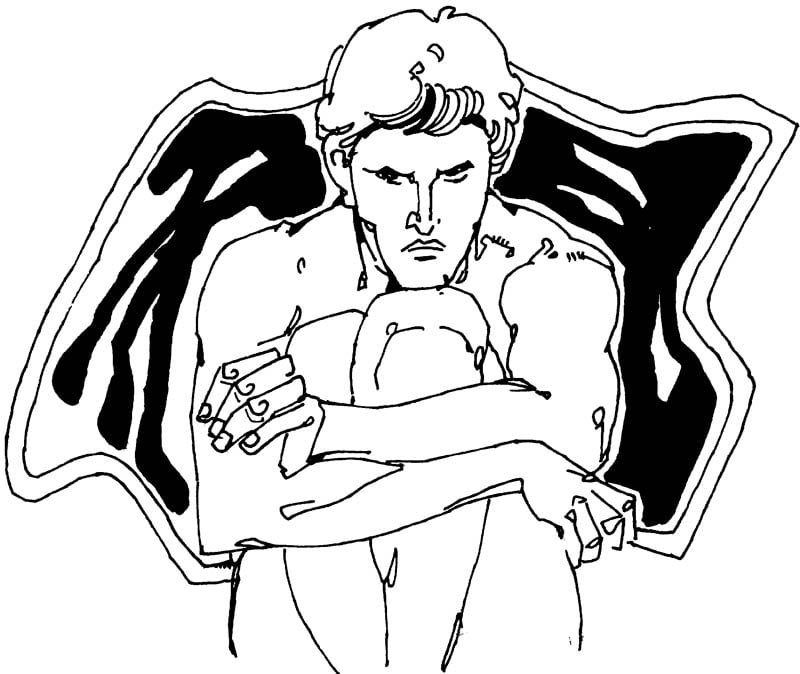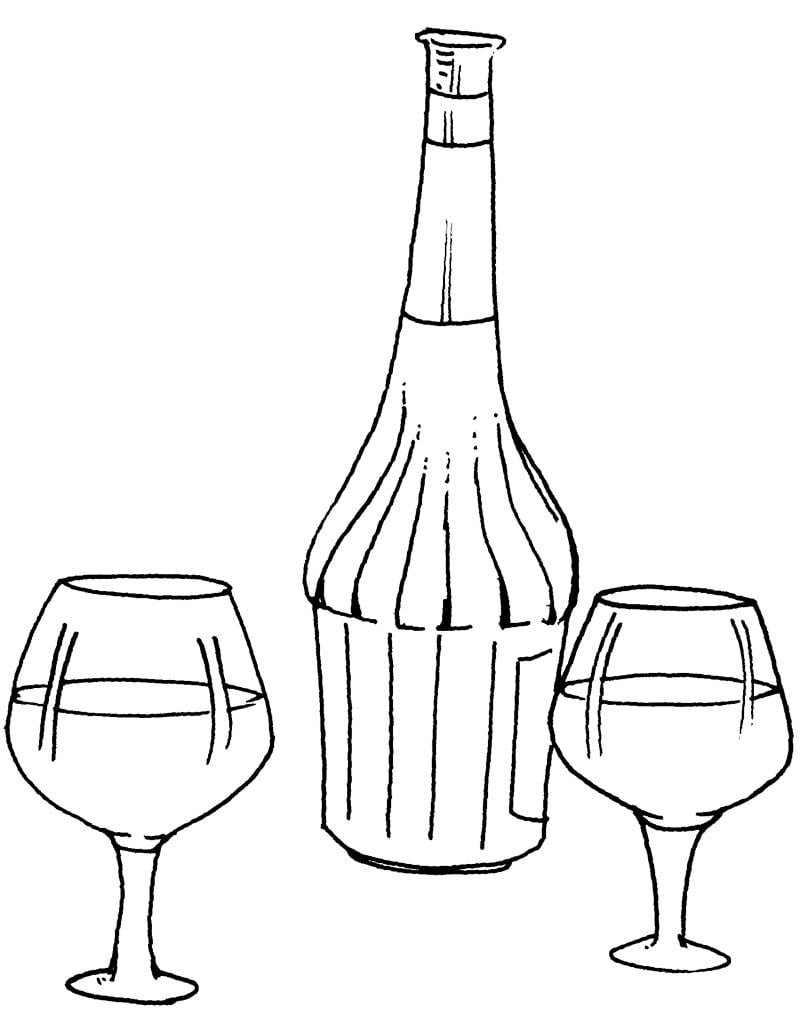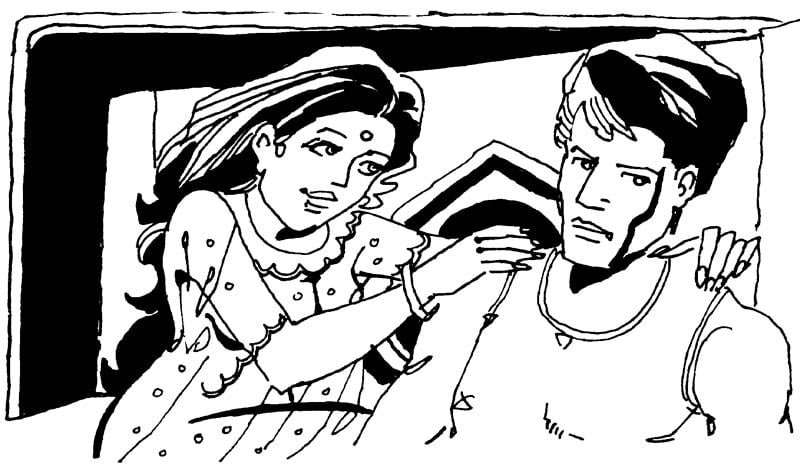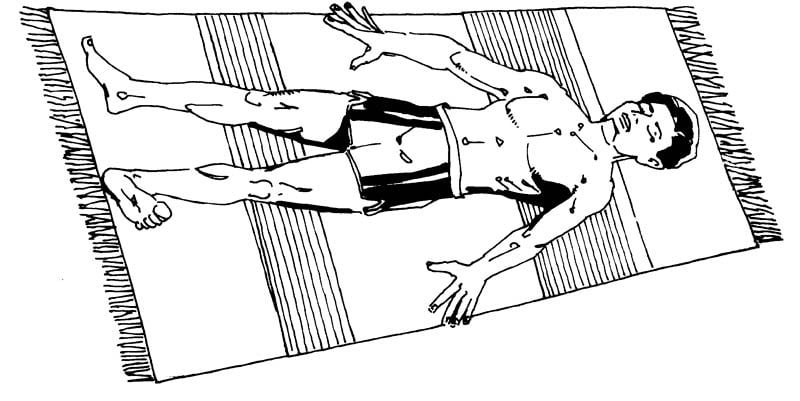Stress is an adaptive response. It’s the body’s reaction to an event that is seen as emotionally disturbing, disquieting or threatening. When we perceive such an event, we experience what one stress researcher called the ‘fight or flight’ response. To prepare for fighting or fleeing, the body increases its heart rate and blood pressure; more blood is then sent to your heart and muscles and your respiration rate increases.

This response was probably beneficial to our cavemen ancestors who had to fight off wild animals. But today, stress itself has become the ‘wild animal.’ Untamed and allowed to run rampant in our lives, it can destroy our health. The modern male’s response to psychological stress differs little from the way our primitive forebears reacted to dangerous animals or other sources of potential physical harm (i.e., with surges of adrenaline, a rise in blood pressure and heart rate, and a increase in blood flow to the muscles needed to fight or run away.)
But today, there are few wild animals to contend with, unless you happen to work in a zoo or live out in the wilds somewhere. Our stress response is more likely triggered by overwhelming responsibilities at home or work, by loneliness, or by the fear of losing our jobs. Not only is uncontrolled stress harmful to our bodies in and of itself, but it can also lead to unwise behaviour such as alcohol and drug abuse, which place us at even greater risk, health wise. It can also jeopardize our relationships, by leading to emotional outbursts and, in some cases, physical violence.
Life without stimulus would be incredibly dull and boring. Life with too much stimulus becomes unpleasant and tiring, and may ultimately damage your health or well-being. Too much stress can seriously interfere with your ability to perform effectively and a consistently high level of stress over a sustained period can damage your health.
The word ‘stress’ is taken from engineering jargon; in essence it means the deformation or change caused on a body by the internal forces that work on it. The maximum stress a body can withstand and still return to its normal state is known as its ‘elastic limit.’ This applies on people too—an individual has his or her own elastic limit, both in terms of degree and type of stress. It is when the body is put under long-term stress that it can reach its snapping point; if it does the damage can be irreparable.
The art of stress management is to keep yourself at a level of stimulation that is healthy and enjoyable. Most people realise that aspects of their work and lifestyle can cause stress. While this is true, it is also important to note that it can be caused by your environment and by the food and drink you consume.
Causes of stress can be sub-divided into following heads :
- Childhood memory and better experiences
- Family culture and pattern
- Family background and habits
- Incompatible marriage and nagging and dominant partner
- Sexual dysfunction and infidelity
- Chronic physical illness and permanent infirmity
- Stressful events of life and retirement
- Social isolation and lack of interaction
- Speech disorders
- Mood changes and behavioural disorders
- Hallucinations, fixed thoughts
- Cognitive functions eroded
- Abnormal beliefs
- Religious rituals and social constraints
- Uncongenial work culture and job-related problems
- Financial ruin and sudden losses
- Phobias
- Alcoholism and Alcohol withdrawal
- Use of Narcotic Drugs and withdrawal (including drug dependency)
- Pessimistic and Negative approach to life.
It is not that all persons suffer from all the said symptoms but, in all the sufferers, a few of the said symptoms suffice to trigger stressful states. It is for the attending physicians and the persons, who are in constant touch with a stressed person, to note the symptoms.
Survival stress
This may occur in cases where your survival or health is threatened, where you are put under pressure, or where you experience some unpleasant or challenging event. Here adrenaline is released in your body and you experience all the symptoms of your body preparing for ‘fight or flight’.
Internally generated stress
This can come from anxious worrying about events beyond your control, from a tense, hurried approach to life, or from relationship problems caused by your own behaviour. It can also come from an ‘addiction’ to and enjoyment of stress.
Environmental and job stress
Here your living or working environment causes the stress. It may come from noise, crowding, pollution, untidiness, dirt or other distractions. Alternatively stress can come from events at work.
Fatigue and overwork
Here stress builds up over a long period. This can occur where you try to achieve too much in too little time, or where you are not using effective time management strategies.
Of all the stressors, the ones related to lifestyle and jobs are the most common. In fact, they form the bulk of stressors. Let us have a look at some of them, it will help you to identify these stressors and learn to deal with them.
Lifestyle and Job Stress
Many of the stresses you experience may come from your job or from your lifestyle. These may include:

Job related stress :
- Too much or too little work
- Having perform beyond your experience or perceived abilities
- Having to overcome unnecessary obstacles
- Time pressures and deadlines
- Keeping up with new developments
- Changes in procedures and policies
Lack of relevant information, support and advice, lack of clear objectives, unclear expectations of your role from your boss or colleagues responsibility for people, budgets or equipment.
Career development stress :
- Under-promotion, frustration and boredom with current role
- Over-promotion beyond abilities
- Lack of a clear plan for career development
- Lack of opportunity
- Lack of job security
Personal and family stresses :
- Financial problems
- Relationship problems
- Ill-health
- Family changes such as birth, death, marriage or divorce
Stress Symptoms
Stress may manifest itself through various symptoms, which can be divided into three categories :
Emotional
Behavioural
Physical
Emotional symptoms of stress
Stress causes many complaints and conditions. When one or more of the signs or symptoms occur more frequently than normal, or are more difficult to shrug off, it indicates that your stress level is becoming unacceptably high. And it is time to review your lifestyle and take steps to reduce stress.


- Worry or anxiety
- Confusion, and an inability to concentrate or make decisions
- Feeling ill
- Feeling out of control or overwhelmed by events
Mood changes: Changes of mood can occur with :
- Depression
- Frustration
- Hostility
- Helplessness
- Impatience and irritability
- Restlessness
- Being more lethargic
- Difficulty in sleeping
- Drinking more alcohol and smoking more
- Changing eating habit
Reduced sex drive
Relying more on medication
Behavioural symptoms of stress
Stress influences behaviour. Behavioural symptoms of Long Term Stress are :
Talking too fast or too loud
Yawning
Fiddling and twitching, nail biting, grinding teeth, drumming fingers, pacing, etc.
Bad moods :
- Being irritable
- Defensiveness
- Being critical
- Aggression
- Irrationality
- Overreaction and reacting emotionally
Reduced personal effectiveness :
- Being unreasonably negative
- Making less realistic judgements
- Being unable to concentrate and having difficulty making decisions
- Being more forgetful
- Making more mistakes
- Being more accident prone
- Changing work habits
- Increased absenteeism
- Neglect of personal appearance
These symptoms of stress should not be taken in isolation— other factors could cause them. However if you find yourself exhibiting or recognising a number of them, then it would be worth investigating stress management.
Physical symptoms of stress
The physical symptoms can be of two kinds—the short term symptoms and the long term symptoms.
Short term physical symptoms
These mainly occur as your body adapts to perceived physical threat, and are caused by release of adrenaline. Although you may perceive these as unpleasant and negative, they are signs that your body is ready for the explosive action that assists survival or high performance:
- Faster heart beat
- Increased sweating
- Cool skin
- Cold hands and feet
- Feelings of nausea, or ‘Butterflies in stomach’
- Rapid Breathing
- Tense Muscles
- Dry Mouth
- A desire to urinate
- Diarrhoea
Short term Performance effects
While adrenaline helps you survive in a ‘fight-or-flight’ situation, it does have negative effects in situations where this is not the case because it interferes with clear judgement and makes it difficult to take the time to make good decisions.
- It can seriously reduce your enjoyment of work.
- Where you need good physical skills it gets in the way of fine motor control.
- It causes difficult situations to be seen as a threat, not a challenge.
- It damages the positive frame of mind you need for high quality work by promoting negative thinking,
- Damaging self-confidence.
- Narrowing attention.
- Disrupting focus and concentration.
- Making it difficult to cope with distractions. It consumes mental energy in distraction, anxiety, frustration and temper. This is energy that should be devoted to the work in hand.
Long Term Physical Symptoms
These occur where your body has been exposed to adrenaline over a long period. One of the ways adrenaline prepares you for action is by diverting resources to the muscles from the areas of the body, which carry out body maintenance. This means that if you are exposed to adrenaline a sustained period, then your health may start to deteriorate. This may show up in several ways like,

Change in appetite
Frequent colds
Illnesses such as:
- Asthma
- Sexual disorders
- Back pain
- Aches and pains
- Digestive problems q Feelings of intense and long-term
- Headaches tiredness
- Skin eruptions
Assessing your Stress Level
At some time in your life there will be some incident or event that causes major stress and may alter your lifestyle. Such crises are often known as life events. Emotional trauma caused by divorce, bereavement and moving house are stressful life events. Researchers discovered that our adaptability and ability to relax and cope with stress was damaged when we go through prolonged period of stressful life events in a single year. Some people find one particular life event more damaging than another; heredity, lifestyle and diet all affect and individual’s response to stress.
Here are some life events and stress points connected with them:
Death of a partner 100
Divorce 73
Separation from partner 65
Death of close family member 63
Injury or illness 53
Getting married 50
Termination of job 47
Pregnancy 40
Retirement 45
Ill health of a family member 44
Sexual difficulties 39
Major business or work changes 39
Change in financial state 38
Death of a friend 37
More arguments with partner 35
Change in responsibilities at work 29
Child leaves home 29
Trouble with in-laws 29
Outstanding personal achievement 28
Changes in living conditions 25
Trouble with boss or employer 23
Change in residence 20
Change in social activities 18
Change in sleeping habits 16
Change in eating habits 15
Minor violations of the law 11
Individual stress levels can be worked out according to the above scale.
Score (in a year) Risk
100 Points 10% increase of illness over the next 2
years.
100-300 Points 50% increase of illness over the next 2
years.
Above 300 Points Dangerous risk of illness over the next 2
years.
How can it be eliminated
A stress free existence is, perhaps, a mirage. The pressures of modem living ensure that stress is always lurking in the background. It can’t be eliminated but one could try to control it.

Stress can be good and bad, depending on the type. Positive stress adds anticipation and excitement to life, and we all thrive under a certain amount of stress. Deadline, competition, confrontations and even our frustrations and sorrows add depth and enrichment to our lives. Our goal is not to eliminate stress but to learn how to manage it and how to use it to help us. Insufficient stress acts as a depressant and may leave us feeling bored or dejected. On the other hand, excessive stress may leave us feeling ‘tied up in knots.’ What we need to do is find the optimal level of stress, which will individually motivate but not overwhelm each of us.
What is optimal stress ?
There is no single level of stress that is optimal for all people. We are all individual creatures with unique requirements. As such, what is distressing to one may be a joy to another. And even when we agree that a particular event is distressing, we are likely to differ in our physiological and psychological responses to it. The person who loves to arbitrate disputes and moves from job site to job site would be stressed in a job, which was stable, and routine, whereas the person who thrives under stable conditions would very likely be stressed on a job when duties were highly varied. Also, our personal stress requirements and the amount which we can tolerate before we become distressed changes with our ages.
It has been found that most illness is related to unrelieved stress. If you are experiencing stress symptoms, you have gone beyond your optimal stress level; you need to reduce the stress in your life and/or improve your ability to manage it.
Two Types of Personalities
Stress-prone personalities are classified as Type A and hardy personalities are said to belong to Type B. Type B personalities show better resistance to stress. It was S. Kobasa who first distinguished the two types.
According to his concept, Type A personalities are disease prone and given to feelings of depression, anger, hostility and anxiety, which in turn makes them susceptible to asthma, headaches, ulcers, arthritis and heart disease, amongst others. Hostility is a significant factor associated with a greater risk of coronary heart disease in such individuals. Type A individuals have increased cortisol levels, which may interfere in the metabolism of lips and cholesterol and contribute to formation of fatty plaques in the arteries.
Such ultra stress-prone individuals tend to be hyper-responsive to stress. They ruminate or daydream about stressful events, cannot put stressors out of their mind and sometimes have nightmares about specific stressors.
Type B personalities display three characteristics— commitment, control and challenge. High on all three counts, hardy individuals exhibit feelings of meaningfulness in their work and relationships, a sense of being in control of events around them and a tendency to interpret stressors as challenges that will be overcome.
How can manage stress better ?
Identifying unrelieved stress and being aware of its effect on our lives is not sufficient for reducing its harmful effects. Just as there are many sources of stress, there are many possibilities for its management. However, all require work toward change: changing the source of stress and/or changing your reaction to it.
How One Should Proceed ?
Become aware of your stressors; and your emotional and physical reactions. Notice your distress. Don’t ignore it. Don’t gloss over your problems. Determine what events distress you. What are you telling yourself about meaning of these events? Determine how your body responds to the stress. Do you become nervous or physically upset? If so, in what specific ways?
What can we change ?
Can you change your stressors by avoiding or eliminating them completely? Can you reduce their intensity (manage them over a period of time instead of on a daily or weekly basis)? Can you shorten your exposure to stress (take a break, leave the physical premises)?
Can you devote the time and energy necessary to making a change (goal setting, time management techniques and delayed gratification strategies may be helpful here)?
Reduce the intensity of emotional reactions
The stress reaction is triggered by your perception of danger—physical danger and/or emotional danger. Are you viewing your stressors in exaggerated terms and/or taking a difficult situation and making it a disaster? Are you expecting to please everyone?
Are you over-reacting and viewing things as absolutely critical and urgent? Do you feel you must always prevail in every situation? Work at adopting more moderate views; try to see the stress as something you can cope with rather than something that overpowers you. Try to temper your excess emotions. Put the situation in perspective. Do not labour on the negative aspects.
Learn to moderate physical reactions
Slow, deep breathing will bring your heart rate and respiration back to normal.

Relaxation techniques can reduce muscle tension. Electronic biofeedback can help you gain voluntary control over such things as muscle tension, heart rate, and blood pressure.
Medications, when prescribed by a physician, can help in the short term in moderating your physical reactions. However, they alone are not the answer. Learning to moderate these reactions on your own is a preferable long-term solution.
Build physical reserves
- Exercise for cardiovascular fitness three to four times a week (moderate, prolonged rhythmic exercise is best, such as walking, swimming, cycling, or jogging).
- Eat well-balanced, nutritious meals.
- Maintain your ideal weight.
- Avoid nicotine, excessive caffeine, and other stimulants.
- Mix leisure with work. Take breaks and get away when you can.
- Get enough sleep. Be as consistent with your sleep schedule as possible.
- Maintain emotional reserves.
Develop some mutually supportive friendships/relationships. Pursue realistic goals, which are meaningful to you, rather than goals others have for you that you do not share. Expect some frustrations, failures, and sorrows. Always be kind and gentle with yourself—be a friend to yourself.
Recognising Your Stressors
Ask yourself :
- Are you a perfectionist?
- Do you feel a constant pressure to achieve?
- Do you criticize yourself when you’re not perfect?
- Do you feel you haven’t done enough no matter how hard you try?
- Do you give up pleasure in order to be the best in everything you do?
- Does your self-esteem depend on everyone else’s opinion of you? Do you sometimes avoid assignments because you’re afraid of disappointing your boss?
- Are you better at caring for others than caring for yourself?
- Do you keep most negative feelings inside to avoid displeasing others? If the answer to all these questions is a ‘yes’, then you are a victim of stress.

